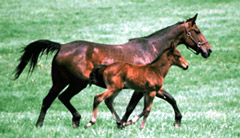UK Equine Scientists Investigating Cause of Mystery Mare Disease
UK Equine Scientists Investigating Cause of Mystery Mare Disease

Equine scientists at the University of Kentucky are working with farm managers and horse industry leaders to rapidly diagnose and control a serious problem affecting the equine industry. An unusually high number of late-term abortions and early fetal deaths have been submitted recently to the UK Livestock Disease Diagnostic Center in Lexington.
"Investigation is underway, and we are pulling more and more people in, not just from our own equine research faculty but also from other UK departments and from the horse industry itself," said David Powell, disease researcher with UK's Maxwell Gluck Equine Research Center.
Horse owners are reporting two problems. One problem is a significant number of late-term abortions and a number of foals being born weak and surviving only a few days. Symptoms in mares include non-production of milk, difficulty giving birth, and stillborn fetuses. The cause is unknown.
Another problem relates to an increased number of mares determined to be pregnant at about 40 days, but then experiencing early fetal loss. Affected mares seem normal during manual pregnancy examinations, but during ultrasound tests an abnormal fluid is seen around the fetus. UK researchers and veterinarians believe this problem may be related to the first, however the cause is also unknown.
The late-term abortions and early fetal losses are widespread and not restricted to Thoroughbreds.
"This is problem involves many breeds and farms," said Powell. "The problem does not appear to be contagious -- that is, spread by one horse coming into contact with another horse.
Horse owners are being urged to report late-term abortions or other similar problems. Veterinarians are being advised to consider ultrasounding mares at 60-65 days of gestation. If the mare aborts, fetal tissue and a serum sample should be submitted to the UK Livestock Disease Diagnostic Center.
As part of the collaborative investigation now underway, a questionnaire was sent on May 7 to horse farm managers.
"We're sending this questionnaire out by way of the Thoroughbred Farm Managers Club," said Powell. "It's going out to all farms in order that we can get a better handle on the true incidence of this condition."
Powell said a fact sheet is being prepared for widespread distribution throughout the state. Information also will be available on the UK College of Agriculture's web site: http://www.ca.uky.edu.
"We're assembling a team that includes equine practitioners, farm managers, nutritionists, soil and pasture specialists, state agencies and others to evaluate the problem," said Powell. "Until we get some more factual information it's difficult to say exactly what the degree of severity is, but at this point we can say we're dealing with an extremely serious problem."
(http://www.ca.uky.edu - updates provided at this site including audio and photographs.)
